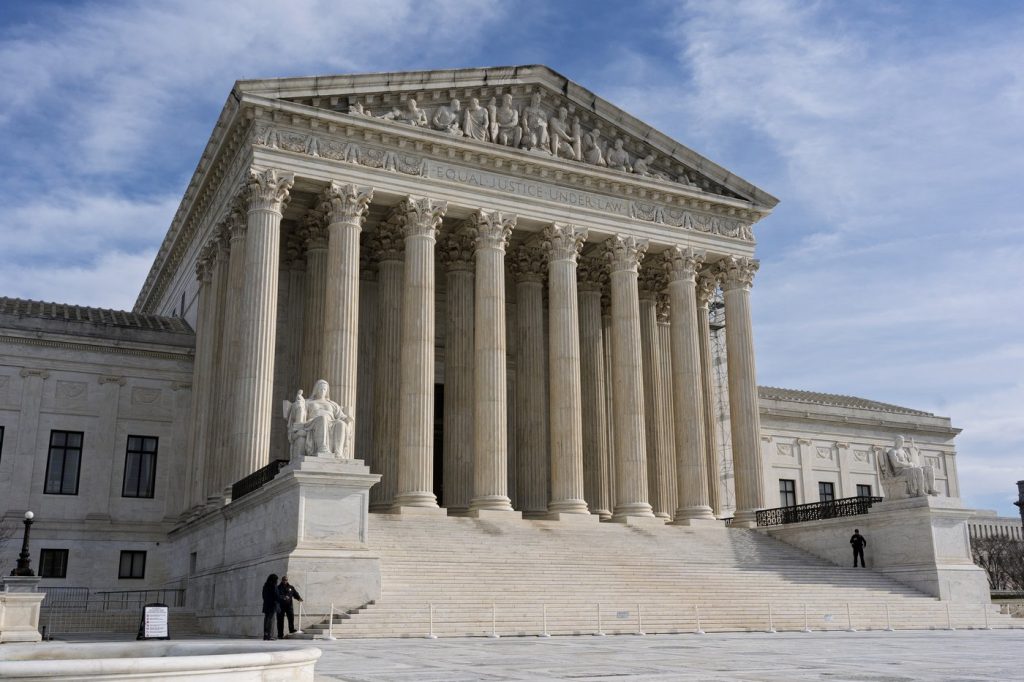WASHINGTON (AP) – The Supreme Court is nearing the end of a term that has been significantly influenced by emergency appeals from the Trump administration, targeting lower court orders that aim to impede President Donald Trump's initiatives to reshape the federal government.
As the court approaches the conclusion of its term, it has 16 cases left to resolve, which were argued between December and mid-May. Among these cases is an urgent appeal regarding Trump’s executive order that denies birthright citizenship to children born in the U.S. to parents who are illegally residing in the country.
Typically, the court aims to finalize its decisions by the end of June. Recently, it ruled on a highly anticipated case that upheld a ban in Tennessee on certain types of healthcare for transgender minors.
One of the most pressing matters before the justices is the challenge to Trump’s birthright citizenship order, which has faced blockades from lower courts. The administration’s emergency appeal seeks to diminish the scope of nationwide injunctions that have frustrated both Republican and Democratic administrations throughout the past decade. These nationwide orders serve as a crucial check against Trump's policies, and at recent arguments, the court expressed a desire to maintain a block on the citizenship restrictions while contemplating limits on the extent of nationwide court orders.
The opposition, including Democratic-led states, immigrants, and various rights organizations, contests Trump’s executive order, maintaining that it would disrupt a long-standing understanding of birthright citizenship that has been established for over 125 years.
Moreover, the court appears poised to side with parents from Montgomery County, Maryland, who are advocating for the right to opt-out their children from school lessons that feature LGBTQ-themed storybooks. The school district, aiming to reflect the diversity in its community, introduced these storybooks in 2022, countering the parents’ concerns after it previously allowed an opt-out system but subsequently retracted the policy, citing disruptions it caused. This case ties into a broader theme of religious rights cases before the court this term, as the justices have frequently supported claims of religious discrimination in recent years amidst a surge in book bans across schools and libraries.
A significant litigation concerning congressional districts in Louisiana is also making its second appearance before the Supreme Court. Following the invalidation of two congressional maps by lower courts since 2022, the justices are assessing whether to mandate state lawmakers to draft a new map for a third time, focusing on the intertwining of race and politics in political boundary delineation. During March arguments, conservative justices suggested the possibility of discarding the map while potentially complicating redistricting lawsuits related to the Voting Rights Act.
The contested congressional map created a second Black majority district in Louisiana, which subsequently elected a Black Democrat in 2024. A three-judge panel ruled that the state over-relied on racial considerations in crafting the district, dismissing Louisiana’s arguments that political motivations, such as preserving influential congressional seats, took precedence. Notably, the Supreme Court permitted the challenged map to be used during the ongoing appeal process.
Lastly, the justices are deliberating on a Texas law aimed at restricting children’s access to online pornography. Texas is one of over a dozen states implementing age verification laws for online content, asserting these measures are vital as access to explicit material becomes increasingly immediate through smartphones. The Supreme Court must determine if the Texas law infringes upon adults’ constitutional rights as well. The Free Speech Coalition, a trade group for the adult-entertainment sector, acknowledges the necessity of shielding minors from pornography but contends the law's wording adversely affects adults by mandating the submission of personal, identifiable information online—which raises concerns about privacy, hacking, and tracking risks.
During deliberations, justices showed a willingness to uphold the law but indicated potential for it to be returned to a lower court for further examination, expressing concern that the previous court had not applied a stringent enough legal standard to evaluate whether the law and similar measures violated First Amendment rights.











